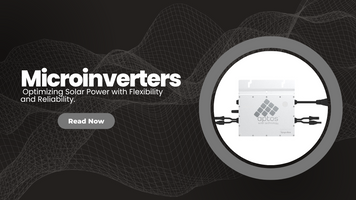What Is a Microinverter?
Posted by Robert Goldsmith on 6th Oct 2023
Microinverters are a common alternative to more traditional inverters and are a popular choice for residential or commercial installations. They offer a compact, reliable, and flexible solution to energy management and have added to the increasing popularity of solar energy. In this blog, we'll explore what microinverters are and how they play a vital role in modern solar energy systems.
What Is a Microinverter?
At its core, a microinverter is a small yet powerful inverter that attaches to your solar array at the modular level and independently manages each panel, or set of panels, connected to it. It acts as the link between individual solar panels and your electrical grid. The primary function of a microinverter is to convert the direct current (DC) electricity produced by each solar panel into alternating current (AC) electricity. This conversion is essential because most of our household appliances and electrical systems operate on AC power.
How Do Microinverters Work?
The novelty of microinverters lies in their panel-level operation. Unlike traditional inverters that are connected to multiple solar panels, microinverters are installed on a per-panel basis. Each solar panel in your array has its dedicated microinverter. This individualized approach optimizes energy production.
Microinverters continuously monitor the performance of each panel and adjust their operation accordingly. Even if one panel is shaded, dirty, or experiencing performance issues, the others can still function at their peak efficiency. This means that your entire solar system operates more efficiently, maximizing energy production.
Advantages of Microinverters:
Microinverters offer several advantages that make them an attractive choice for solar installations:
- Increased Energy Production: Microinverters optimize the output of each solar panel, resulting in higher overall energy production for your system.
- Flexibility: Microinverters can accommodate solar panels with different orientations and shading conditions, providing flexibility in system design.
- System Monitoring: Many microinverter systems come with advanced monitoring capabilities, allowing you to track the performance of each panel in real-time.
- Reliability: Microinverters enhance the reliability of your solar installation. If one panel or microinverter experiences an issue, it doesn't affect the entire system.
Additionally, one of the key safety features of microinverters is their ability to provide built-in module-level rapid shutdown. In the United States, this feature is crucial for rooftop solar installations to comply with National Electric Code (NEC) requirements. During emergencies or maintenance, microinverters can quickly and automatically shut down the electrical output of each solar panel, reducing the risk of electrical hazards. This ensures that first responders and maintenance personnel can work safely around the solar array.
Applications and Use Cases:
Microinverters are well-suited for a variety of applications, including residential and commercial installations. They are particularly beneficial for residential rooftops, where shading and panel orientation can vary significantly. Additionally, microinverters are a popular choice for expanding existing solar systems, as they can be easily added to enhance overall performance.
Considerations and Limitations:
While microinverters offer numerous benefits, it's essential to consider potential drawbacks. These may include:
- Cost: Microinverters can be more expensive upfront compared to traditional inverters.
- Maintenance: Although microinverters typically require minimal maintenance, addressing any issues with individual inverters can be complex compared to maintaining a single central unit.
- Compatibility: When adding microinverters to an existing solar installation, assess the compatibility with your original system.
Conclusion:
In conclusion, microinverters have been revolutionary to the world of solar energy by maximizing the efficiency and reliability of solar systems. Their ability to optimize the performance of individual solar panels makes them an excellent choice for those seeking to enhance their system efficiency. As solar technology continues to evolve, microinverters are likely to continue playing a crucial role in making clean, renewable energy accessible to everyone.
If you're interested in harnessing the full potential of solar energy with microinverters, we're here to help. Contact our team of experts for personalized guidance and to evaluate your specific needs to determine whether microinverters are the right choice for you.

